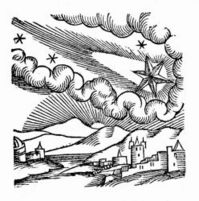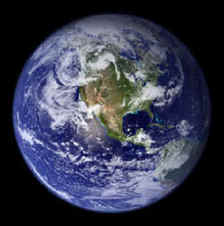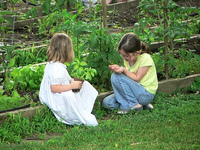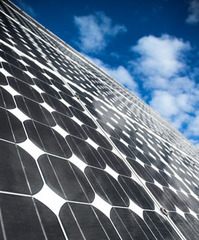A growing concern is the sustainability of the earth given the life we lead. Uncritical
 consumption of goods and lack of regard for sound ecological principals can be distressing and theologically bankrupt. The good stewardship of the gifts God has given is paramount. In the recent past the pope told assembled audiences that the created world is a great gift of God but it is "exposed to serious risks by life choices and lifestyles that can degrade it. In particular, environmental degradation makes poor people's existence intolerable." In another place Pope Benedict said, "In dialogue with Christians of various churches, we need to commit ourselves to caring for the created world, without squandering its resources, and sharing them in a cooperative way."
consumption of goods and lack of regard for sound ecological principals can be distressing and theologically bankrupt. The good stewardship of the gifts God has given is paramount. In the recent past the pope told assembled audiences that the created world is a great gift of God but it is "exposed to serious risks by life choices and lifestyles that can degrade it. In particular, environmental degradation makes poor people's existence intolerable." In another place Pope Benedict said, "In dialogue with Christians of various churches, we need to commit ourselves to caring for the created world, without squandering its resources, and sharing them in a cooperative way."
Reading The Compendium of the Social Doctrine of the Church we see a teaching that says the world's poor, who very often live in slums, are connected to the environmental crisis. In cases of poverty and hunger, it is "virtually impossible" to avoid environmental exploitation.
The Holy Father urges us to listen to "the voice of the Earth" or risk destroying it. Moreover he said, "We cannot simply do what we want with this Earth of ours, with what has been entrusted to us."
Noting that the world's religions have shown a growing interest in the environment, particularly the ramifications of climate change; look at the statements of Patriarch Bartholomew, known as the "Green Patriarch," on environmental matters. He voices his concern and pledges support; so I would say that Orthodox Christians are ahead of Western Christians when it comes to working for a more green environment. A rather dire prediction was given by Benedict: "We must respect the interior laws of creation, of this Earth, to learn these laws and obey them if we want to survive. This obedience to the voice of the Earth is more important for our future happiness...than the desires of the moment. Our Earth is talking to us and we must listen to it and decipher its message if we want to survive."
At the new year, Pope Benedict's World Day of Peace message of 2008 focused two paragraphs on our responsibility for the earth today and for the future. He said,
The family needs a home, a fit environment in which to develop its proper relationships.
 For the human family, this home is the earth, the environment that God the Creator has given us to inhabit with creativity and responsibility. We need to care for the environment: it has been entrusted to men and women to be protected and cultivated with responsible freedom, with the good of all as a constant guiding criterion. Human beings, obviously, are of supreme worth vis-à-vis creation as a whole. Respecting the environment does not mean considering material or animal nature more important than man. Rather, it means not selfishly considering nature to be at the complete disposal of our own interests, for future generations also have the right to reap its benefits and to exhibit towards nature the same responsible freedom that we claim for ourselves. Nor must we overlook the poor, who are excluded in many cases from the goods of creation destined for all. Humanity today is rightly concerned about the ecological balance of tomorrow. It is important for assessments in this regard to be carried out prudently, in dialogue with experts and people of wisdom, uninhibited by ideological pressure to draw hasty conclusions, and above all with the aim of reaching agreement on a model of sustainable development capable of ensuring the well-being of all while respecting environmental balances. If the protection of the environment involves costs, they should be justly distributed, taking due account of the different levels of development of various countries and the need for solidarity with future generations. Prudence does not mean failing to accept responsibilities and postponing decisions; it means being committed to making joint decisions after pondering responsibly the road to be taken, decisions aimed at strengthening that covenant between human beings and the environment, which should mirror the creative love of God, from whom we come and towards whom we are journeying.
For the human family, this home is the earth, the environment that God the Creator has given us to inhabit with creativity and responsibility. We need to care for the environment: it has been entrusted to men and women to be protected and cultivated with responsible freedom, with the good of all as a constant guiding criterion. Human beings, obviously, are of supreme worth vis-à-vis creation as a whole. Respecting the environment does not mean considering material or animal nature more important than man. Rather, it means not selfishly considering nature to be at the complete disposal of our own interests, for future generations also have the right to reap its benefits and to exhibit towards nature the same responsible freedom that we claim for ourselves. Nor must we overlook the poor, who are excluded in many cases from the goods of creation destined for all. Humanity today is rightly concerned about the ecological balance of tomorrow. It is important for assessments in this regard to be carried out prudently, in dialogue with experts and people of wisdom, uninhibited by ideological pressure to draw hasty conclusions, and above all with the aim of reaching agreement on a model of sustainable development capable of ensuring the well-being of all while respecting environmental balances. If the protection of the environment involves costs, they should be justly distributed, taking due account of the different levels of development of various countries and the need for solidarity with future generations. Prudence does not mean failing to accept responsibilities and postponing decisions; it means being committed to making joint decisions after pondering responsibly the road to be taken, decisions aimed at strengthening that covenant between human beings and the environment, which should mirror the creative love of God, from whom we come and towards whom we are journeying.
In this regard, it is essential to "sense" that the earth is "our common home" and, in our stewardship and service to all, to choose the path of dialogue rather than the path of unilateral decisions. Further international agencies may need to be established in order to confront together the stewardship of this "home" of ours; more important, however, is the
 need for ever greater conviction about the need for responsible cooperation. The problems looming on the horizon are complex and time is short. In order to face this situation effectively, there is a need to act in harmony. One area where there is a particular need to intensify dialogue between nations is that of the stewardship of the earth's energy resources. The technologically advanced countries are facing two pressing needs in this regard: on the one hand, to reassess the high levels of consumption due to the present model of development, and on the other hand to invest sufficient resources in the search for alternative sources of energy and for greater energy efficiency. The emerging counties are hungry for energy, but at times this hunger is met in a way harmful to poor countries which, due to their insufficient infrastructures, including their technological infrastructures, are forced to undersell the energy resources they do possess. At times, their very political freedom is compromised by forms of protectorate or, in any case, by forms of conditioning which appear clearly humiliating.
need for ever greater conviction about the need for responsible cooperation. The problems looming on the horizon are complex and time is short. In order to face this situation effectively, there is a need to act in harmony. One area where there is a particular need to intensify dialogue between nations is that of the stewardship of the earth's energy resources. The technologically advanced countries are facing two pressing needs in this regard: on the one hand, to reassess the high levels of consumption due to the present model of development, and on the other hand to invest sufficient resources in the search for alternative sources of energy and for greater energy efficiency. The emerging counties are hungry for energy, but at times this hunger is met in a way harmful to poor countries which, due to their insufficient infrastructures, including their technological infrastructures, are forced to undersell the energy resources they do possess. At times, their very political freedom is compromised by forms of protectorate or, in any case, by forms of conditioning which appear clearly humiliating.
 Yahoo carries a video story on the installation of solar panels at the Paul VI Audience Hall and Ecotality Life publishes a story on the greening of the Vatican. The point is not that we garner Catholic support for green technology, green gadgets and green gizmos for a new industry but that we take seriously the needs of the planet, our own needs and those of our brothers and sisters.
Yahoo carries a video story on the installation of solar panels at the Paul VI Audience Hall and Ecotality Life publishes a story on the greening of the Vatican. The point is not that we garner Catholic support for green technology, green gadgets and green gizmos for a new industry but that we take seriously the needs of the planet, our own needs and those of our brothers and sisters.
The Catholic News Service carried two stories yesterday on the eco-friendly work of the Pope:
First saplings of Vatican reforestation project to be planted
VATICAN CITY (CNS) -- The first saplings of the Vatican Climate Forest, a reforestation project to offset the Vatican's carbon dioxide emissions, will be planted in November, the Vatican newspaper said. The U.S.-based Planktos Inc. and its Hungarian partner, KlimaFa Ltd., are restoring more than 600 acres of forests in Hungary along the Tisza River to offset emissions of carbon dioxide, or CO2. The two companies earn money by selling greenhouse-gas mitigation credits to individuals and businesses. Whatever carbon dioxide emissions an individual or company cannot eliminate can be offset by planting trees or buying the carbon mitigation credits of a company that plants trees or takes other action to eliminate carbon dioxide from the atmosphere. Planktos and KlimaFa announced in 2007 that they would donate to the Vatican enough mitigation credits to offset the Vatican's annual CO2 production, estimated at 10,000 tons.
People must live morally, ethically, to save environment, says pope
CASTEL GANDOLFO, Italy (CNS) -- The only way to put an end to environmental degradation is for people to live more simply and ethically, said Pope Benedict XVI. All of creation represents "an enormous gift from God to humanity" so people have a responsibility to "protect this treasure" and dedicate themselves "against an indiscriminate use" of the earth's resources, he said. The pope made his comments during a Sept. 27 audience with members of the Italian Tourist Youth Center and the Belgium-based International Bureau of Social Tourism. The audience also marked World Tourism Day which is sponsored by the U.N. World Tourism Organization. It was dedicated this year to the theme "Responding to the Challenge of Climate Change." The pope said, "Environmental degradation can only be stopped by spreading an appropriate culture of behavior that includes more sober lifestyles."


Leave a comment